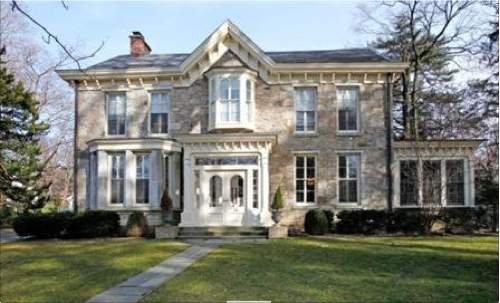Trustees Discuss Proposed Changes to Scarsdale's Historic Preservation Law
- Tuesday, 05 March 2013 12:10
- Last Updated: Thursday, 07 March 2013 13:22
- Published: Tuesday, 05 March 2013 12:10
- Hits: 4339
 Draft amendments to Scarsdale Village's Historic Preservation Law could result in the demolition of even more homes, as under the new law many Scarsdale properties would be able to evade demolition review. Though the revised code could offer some protection to homes and properties listed in Scarsdale's Cultural Resources Survey, others, that some might deem "historic", would not require review before being razed.
Draft amendments to Scarsdale Village's Historic Preservation Law could result in the demolition of even more homes, as under the new law many Scarsdale properties would be able to evade demolition review. Though the revised code could offer some protection to homes and properties listed in Scarsdale's Cultural Resources Survey, others, that some might deem "historic", would not require review before being razed.
The Law and Land Use Committees of the Board of Trustees met on Wednesday 2-27 to discuss draft amendments to Village Code Chapter 182 - Historic Preservation. The Committees undertook a review of the code in light of the Reconnaissance Level Cultural Resource Survey Report (Survey Report) conducted by Li/Saltzman Architects and Professor Andrew M. Dolkart, which listed 13 Vllage landmarks and 68 homes that the surveyors believe warrant protection.
The revised code does not impose designated historic status on these structures (thus barring their demolition); rather, it allows owners to consent to granting historic status. Although property owners would still be allowed to renovate and rehabilitate their homes, several Trustees made the point that it is easier and cheaper to demolish a house than to rehabilitate it. Thus, the Committees must balance property owner cost concerns with the desire to ensure protection of Scarsdale's historic properties. The Committee appears to favor an owner consent rule.
Several Trustees praised the Survey Report, but also expressed reservations about imposing historic status on the structures based on just this survey. Referring to the Survey Report's focus on architectural style, Trustee Stacey Brodsky stated, "a lovely example of architectural style. . .. in and of itself . . . is not a basis on which I would be comfortable imposing over an owner's consent, a designation of the historic value of the house." She thus views the Survey Report as a "starting point," but not sufficient to impose status on a structure over an owner's consent. Village Manager Alfred Gatta agreed, saying that the Trustees would not be able to defend imposing this status based on its current information and if they were going to impose status, costly "in-depth surveys" would have to be conducted. Trustee Robert Steves also praised the Survey Report but agreed that it should not be viewed as "the Bible" of whether a house in Scarsdale has historic value. He also mentioned some due process concerns that could arise if Scarsdale imposes historic status on a property.
Trustee Brodsky emphasized the need to eliminate "demolition permits to no end" and to get the Committee for Historic Preservation out of the "demolition business" and into a role that allows them to participate in the community education process, as suggested in the proposed new code. Ms. Brodsky expressed concern about a strict consent version and spoke in favor of the revised code's tiered structure, which allows for voluntary designation of historic status of properties listed in the Survey Report and, in cases where owners have not consented to such status, uses the Survey Report as a trigger for the CHP's closer examination of a demolition permit application. Several trustees agreed. Trustee Kay Eisenman and a Village resident also suggested offering incentives like loan programs and generous tax rebates to property owners who consent to historic status designation. Once granted, historic status and benefits would stay with the property and bind or benefit future owners.
Associate Village Historian Bill Natbony expressed concerns about a loophole in the proposed law whereby property owners seeking to demolish property not listed in the Survey Report will no longer go before the CHP. Thus, properties outside the Survey Report, that may still be historic, will evade CHP review. Paul Diamond echoed that thought, saying that this loophole deserves repeated attention.
Trustee Brodsky said that revisions to the law are still in the "brainstorming phase," and the group has not yet considered forming historic districts, also suggested in the Survey Report.
Ultimately, the Trustees referred the issue to another Land Use meeting, where they will set a specific agenda. A future public hearing is also likely in order to hear substantive community feedback – particularly from those whose homes have been listed in the Survey Report as warranting protection.
Contributor Lindsay Dembner lives in Scarsdale. She is an English major turned lawyer currently pursuing employment in higher education and education nonprofits.







